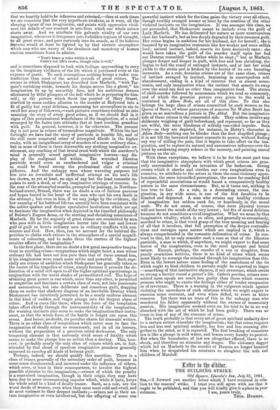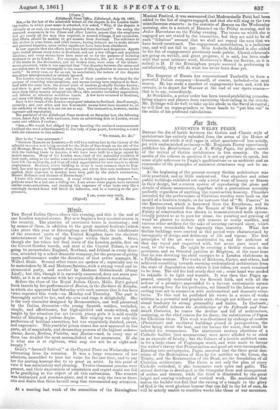Ittitr b tkt
THE BUILDING STRIKE.
Old Square, Lincoln's Inn, July 31, 1861. Sta,—I forward you another letter which I have received in rela- tion to the masons' strike. I trust you will agree with me that it ought to be published, and that you will kindly give it a place in your
columns. I am, yours truly, Taos. Humus.
[Cory.]
Edinburgh News Office, Edinburgh, July 29, 1861. Sin,—In the last of the admirable letters on the dispute in the London build- ing trades, to which your name is attached, it is asked, "Why, if the dispute is virtually at an end, are masons being imported from Scotland?" On seeing the repeated assurances in the Times and other London papers that the employers had got nearly all the men they required, it seemed strange, if not suspicious, that efforts should be making to get masons from Scotland. The reference to this matter in your letter, and other causes, having induced me to make minute and personal inquiries, some rather significant facts have been elucidated.
It now appears that the efforts have been both extensive and desperate. Agents have visited almost every town in Scotland, and not a few villages and populous districts; and every means have been resorted to for the purpose of inducing workmen to go to London. For example, in Arbroath, 33s. per week, expenses of the trains to the destination, and no broken time, were some of the induce- ments presented, while it was reported that "the disputes between the union and non-union men in the metropolis is the cause of this application to masons in the north." In every case, so far as can be ascertained, the nature of the dispute was either misrepresented or entirely ignored.
The London operatives having sent two of their number to Scotland for the purpose of removing misconceptions, and means having been employed in Scot- land with the same view, the actual state of matters gradually became known ; and there is good authority for saying that, notwithstanding the efforts, little more than thirty masons accepted the offers, this number including apprentices, and inferior or otherwise worthless hands. A few have returned to Scotland, and more will likely adopt the same course.
Such is the result of the London employers' mission to Scotland. Small enough, certainly ; and now other and less honourable means have been resorted to, on the authority of whom it is not for me to say. The transaction, however, merits exposure aud reprobation.
The publisher of the Edinburgh News received, on Saturday last, the following letter, dated July 26, with enclosure, from an advertising firm in London, whose name and address I enclose: "Sin,—We would feel obliged by your inserting the enclosed announcement (without the word advertisement) in the body of your paper, forwarding a COPY with the CHARGE to this address.
"We remain, &c. &c." Here is the "announcement" "Scram Masoxs IN LONDON.-It will be a curious fact in the history of the splendid mansion now being erected for the Duke of Buccleugh on the site of the old Montagu House, in Whitehall, that, from peculiar circumstances in connexion with the building trade in London, it will have been built to a large extent by Scotch masons. Many of the London men, tired of the unhealthy condition of their craft, owing to the undue control exercised by the paid leaders of the strike, have left the metropolis, and thus afforded opportunities for new hands to obtain employment. Scotland, where building in stone is more common than in Eng- land, has sent up a great number of masons, and where first-rate workmen have applied, their expenses to London have been paid by the duke's contractors,
Messrs. Hollands and Hannen of Bloomsbury." • I leave this without comment. A cause which requires such desperate ex- pedients mast be a bad and a failing one. I am aware other papers have received similar communications, and trusting this exposure of what looks very like a cunningly devised fraud will break its influence, and be a warning to the per- petrators, I am, yours very truly,































 Previous page
Previous page